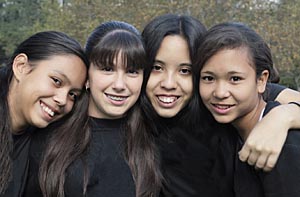Nine of 10 teen girls report experiencing sexual harassment, and majorities also say they have received discouraging comments about their abilities in school and athletics, according to a new study that appears in the May/June issue of the journal Child Development.
The study of 600 girls between the ages of 12 and 18 from California and Georgia was conducted by Campbell Leaper, professor of psychology at the University of California, Santa Cruz, and Christia Spears Brown, assistant professor of psychology at the University of Kentucky.
"Sexism remains pervasive in the lives of adolescent girls," said Leaper. "Most girls have experienced all three types of sexism--sexual harassment, sexist comments about their academic abilities, and sexist comments about their athletic abilities."
Sexual harassment included receiving inappropriate and unwanted romantic attention, hearing demeaning gender-related comments, being teased about their appearance, receiving unwanted physical contact, and being teased, bullied, or threatened with harm by a male. "Our findings on sexual harassment are, sadly, consistent with previous research," said Leaper. "But on the other hand, most girls said they'd experienced sexual harassment at least once, as opposed to several times."
Girls also commonly reported having received discouraging comments about their abilities because of their gender. In particular, 76 percent of girls said they had received discouraging comments about their abilities in sports, and 52 percent said they'd received discouraging comments related to their abilities in science, math, or computers--three areas Leaper focused on because of the persistent gender gap in academics.
"In all cases, the most common sources of discouraging comments were their male peers, which is both understandable and sad," said Leaper, noting that parents, teachers, and coaches also convey such comments.
As grim as the findings appear, Leaper said the frequency of discouraging incidents may be decreasing, compared to the experiences of girls 30 years ago. "It may be that these girls are experiencing isolated incidents that occur here and there," said Leaper. "The fact that there are more girls in sports and math and science today than 30 years ago suggests there are fewer barriers than there were in the past."
Leaper's study was the first to try to identify the factors that predict whether girls will recognize their experiences as sexism. Recognizing when sexism occurs is a crucial first step toward overcoming discrimination, according to Leaper. "Otherwise, it is more likely that individuals attribute failure to their lack of ability rather than to the obstacles in their environment," he said.
Older girls and those from lower socioeconomic backgrounds reported more sexism than their peers, and Latina and Asian American girls reported less sexual harassment than girls from other ethnic groups, according to the study. Moreover, girls who had learned about feminism through the media or from people in their lives, including mothers and teachers, were more likely to recognize it than girls who had never heard about feminism, and girls who felt pressure from parents to conform to gender stereotypes perceived more sexism than other girls.
"The more girls feel encouraged to adopt traditional gender roles, the more sensitive they are to sexism," said Leaper, who likened sensitivity to sexism to awareness of racism. "In order to recognize sexism, you probably have to believe it's wrong."
But being aware of sexism doesn't predispose girls to overreport it, noted Leaper.
"We know from previous studies that people tend to underreport discrimination," said Leaper. "After Anita Hill, reports of sexual harassment increased dramatically in the United States, because it gave people a label for their experience. So, if anything, sexism is probably occurring more than the girls in this study are saying it is. Our research suggests that parents, teachers, and the media can help girls to learn about discrimination and recognize when it occurs."
#####
Note to journalists: Campbell Leaper may be reached by contacting Jennifer McNulty in the UCSC Public Information Office at (831) 459-2495 or jmcnulty@ucsc.edu. The study, titled "Perceived Experiences with Sexism Among Adolescent Girls," appears in Child Development, Vol. 79, Issue 3.



